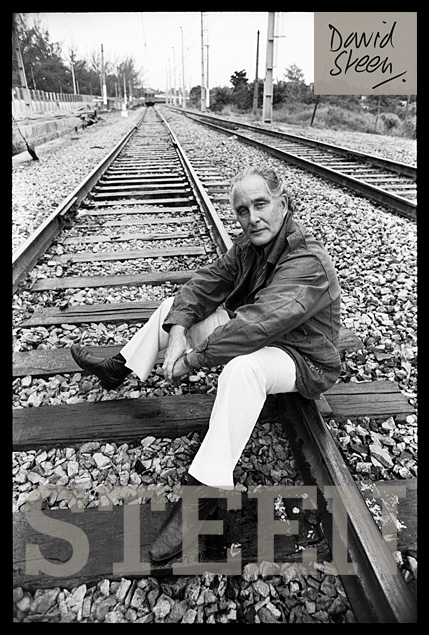Description
David Steen recalls: “I bumped into Ronnie Biggs sitting in a bar on the Copacabana and introduced myself.
Recognising a fellow Londoner, the fugitive Great Train Robber was keen to talk about London and the places he knew and missed. The anniversary of the robbery was coming up on 8th August (coincidentally Ronnie’s birthday) so it was an opportunity to take some shots of Ronnie and release them at that time.
After a few beers I suggested this and Ronnie agreed, for him it meant another meeting and a chance to chat, he was seriously homesick. But he was apprehensive when I first suggested the railway line would be a good location. Brazilian railway lines are military installations and if you’re caught on them, you’re arrested and shut away, and Ronnie didn’t want any trouble. But then he proposed driving out of town 20 miles and just doing it quietly somewhere. It was important the clothes he wore in the picture looked powerful and here he looks very macho.
Mardi Gras was coming up when we did that shot and the following day was my birthday, which had come up in conversation, and Ronnie suggested going out to celebrate. Shortly after I returned to my hotel that evening there was a knock at the door. A beautiful young Brazilian woman stood there. ‘I am your birthday present from Ronnie’, she said. ‘Mr Biggs sent me’. Two hotel security guards were close on her heels and showed her the way out.”
Location: Rio De Janeiro, Brazil
Year: 1979
Biography: One of Britain’s most notorious criminals, Ronnie Biggs was one of a 15-strong gang that robbed the Glasgow-to-London mail train in 1963, netting £2,631,784. It was a crime that captured the public’s imagination and became known as ‘The Great Train Robbery’. The truth is, Biggs was nothing more than a petty criminal before the robbery, who was desperately seeking some extra cash to expand his joinery business. Turned down for a £500 loan by the leader of the gang, Bruce Reynolds, he was offered a share of the loot if he could find a train driver to aid the robbery. Following the crime, several of the gang went on the run – all but two were later caught – but most were quickly convicted and given unusually harsh sentences; no one died in the robbery, and even the train driver, who was coshed on the head, said that gang members bandaged his head and behaved like gentlemen. In 1965, Biggs escaped from Wandsworth prison and fled to Rio de Janeiro. The media made out that he was living like a king, but actually he struggled for money for the rest of his life. After 30 years in Brazil – during which time he survived a kidnapping attempt by the British mercenary soldiers, and released a single with the remnants of the punk group The Sex Pistols – Biggs returned to Britain, a frail and desperately ill old man. Nevertheless, he was thrown in prison for his remaining years and died in 2013. A charming man, the archetypal lovable rogue, he remains a hero to many.
Print Type: Fibre-based Harman Galerie Digital
Printed by: Metro Imaging, London
Limited Editions: All prints are limited editions, no further prints are produced once sold
Bespoke: All prints are bespoke and printed to order, stamped and numbered
Presentation: Prints are supplied to clients flat in an acid-free box or rolled in a tube
Watermark: Watermarks will not be present on an original print
Tags: ronnie biggs, the great train robbery, 1973, 70s, 1970s, the seventies, famous, fame, fugitive, 1963, british, english, thief, escape, escaped prison, rio de janeiro, brazil, villain
Copyright: © David Steen / The David Steen Archive


Recent Comments